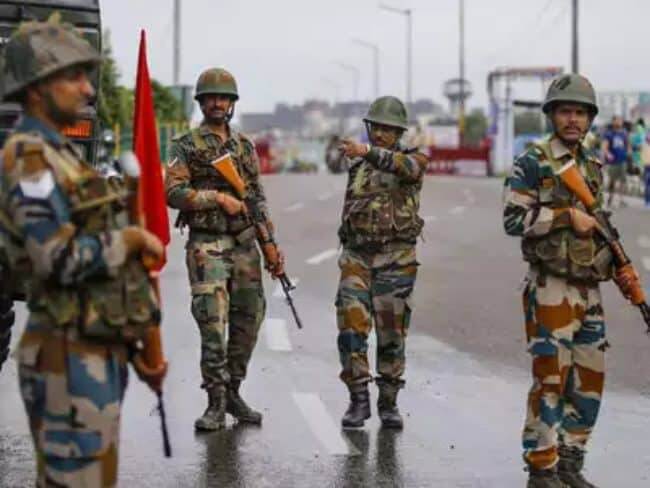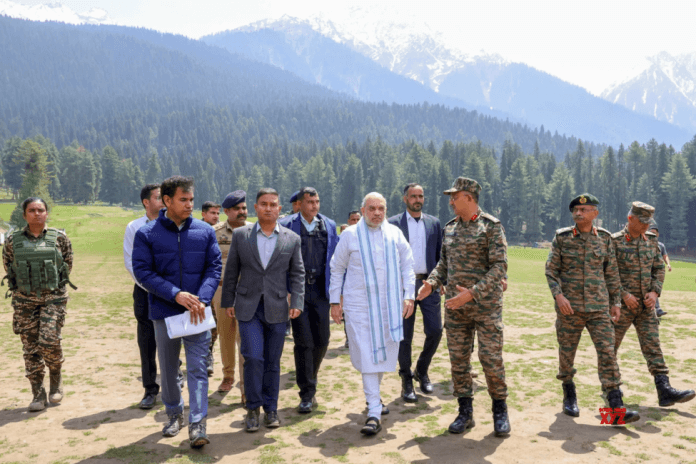On the afternoon of April 22, 2025, Pahalgam, the serene tourist hotspot in Indian Kashmir was shattered by a brazen act of terror. Six terrorists—all either originating from Pakistan or trained there—launched an attack that not only rattled the region’s peace but also struck at the very livelihood of Jammu and Kashmir’s people. The facts, now clear and indisputable, have ignited strong reactions from political leaders, business figures, and everyday citizens alike, demanding accountability and a robust response from New Delhi.
The Pahalgam terror attack was more than a mere violent episode; it was an assault on the emblem of peace and prosperity in Jammu and Kashmir. As news of the incident spread, criticism quickly mounted against Pakistan’s apparent complicity. A notable voice came from Pakistani Hindu cricketer @DanishKaneria61 on the social platform X (formerly Twitter), who challenged his country’s leadership: “If Pakistan truly has no role in the Pahalgam terror attack, why hasn’t Prime Minister @CMShehbaz condemned it yet? Why are your forces suddenly on high alert? Because deep down, you know the truth — you’re sheltering and nurturing terrorists. Shame on you.”
If Pakistan truly has no role in the Pahalgam terror attack, why hasn’t Prime Minister @CMShehbaz condemned it yet? Why are your forces suddenly on high alert? Because deep down, you know the truth — you’re sheltering and nurturing terrorists. Shame on you.
— Danish Kaneria (@DanishKaneria61) April 23, 2025
This pointed commentary not only underscores suspicions about Pakistan’s involvement but also reflects the broader regional discontent with grievances.
View this post on Instagram
In India – and especially Kashmir – the response has been equally clear. National leaders and state figures such as CM Abdullah, Mehbooba Mufti, and religious leader Mirwaiz Farooq have joined forces with business leaders to call for a strike against terrorism. This stands out as a historical moment: Kashmiris are uniting in opposition to terrorism, a marked departure from times when such attacks were either excused or minimised by segments of the leadership. The collective reaction is clear, a reflection of both outrage and a deep-seated desire to protect the people and the economy of Jammu and Kashmir.
The Indian political leadership, meanwhile, has not remained idle. Among the immediate measures, the government has suspended the Indus Water Treaty, a move that significantly disrupts Pakistan’s economic framework while costing India nothing. Critics and strategists alike have contemplated further steps India might take, including the following:
- A permanent withdrawal of Most Favoured Nation (MFN) status for Pakistan, along with tariffs at 200%
- Sanctions against firms re-exporting Indian goods via Dubai (increasing the cost of such practices)
- Advanced cyber and artificial intelligence strikes in strategic locations in Pakistan targeted at their financial and digital infrastructure
- Continue to give “moral and diplomatic support” to the Balochistan, Sindh and PoK, as Pakistan has shown it can do.

Security has been beefed up in the entire Jammu and Kashmir region post the Pahalgam terror attacks (File Photo)
These proposals signal an evolving strategy in which surgical strikes and targeted sanctions replace blanket condemnations and zero action. Other analysts have even floated more aggressive ideas:
- Initiating selective military cooperation with Afghanistan Taliban
- Engaging in precision operations in Pakistan—operations that might involve key targets like Asim Munir.
Although such steps carry complex geopolitical ramifications (the Taliban are hardly faithful allies, as the Americans well know), proponents argue that in this era of counter-terrorism, measured yet decisive action could serve as a deterrence against external support to militant networks. Pahalgam terror attack
However, the response on both sides of the border also comes with a cautionary note. There are certain things that we MUST NOT do, like:
- Measures against terrorism must not devolve into an indiscriminate targeting of Muslims or the people of Jammu and Kashmir. Indeed, the public sentiment emphasises that while terrorists may receive protection or patronage beyond the border, the innocent people who continue to live and work in Kashmir deserve support, not suspicion.
- The call for unity is strong: “Show our strength by continuing to visit Kashmir, albeit with more military protection” as urged by contributors from various sectors. Tourism, a lifeline for the local economy, should be preserved and protected with enhanced security measures, rather than abandoned in fear or prejudice.

Suspension of the Indus Water Treaty means Pakistan loses control of about 80% of the total water flow from rivers in India (File photo)
There are, of course, several furious voices calling for full-scale attacks. An attack may feel good for a few days, but any random Indian pilot can be brought down, as we saw with Abhinandan a few years ago. This will force a cessation of action and render other actions ineffective. These must be avoided since India has far sharper and more effective weapons in its arsenal than to bomb the enemy indiscriminately. No – we should attack with precision. Again, the focus should be on targeting the enemies of peace, not random people on the basis of religion; we leave that to the terrorists.
As India moves forward, it must do so with the dual objectives of dismantling terror networks and uniting its people against ideologies that threaten communal harmony. The pathway to a secure and prosperous Kashmir lies in unyielding strength, a commitment to justice, and an unbreakable social bond that stands in stark contrast to terror and malevolence.
Read more: ‘Go tell this to Modi’, attacker told me after killing my husband: Pahalgam attack survivor





